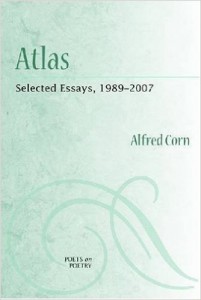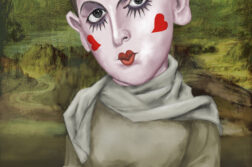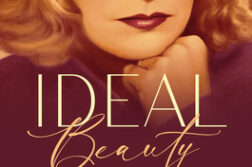 Atlas: Selected Essays, 1989–2007
Atlas: Selected Essays, 1989–2007
by Alfred Corn
University of Michigan Press. 173 pages, $22.95
“I ONCE asked Christopher Isherwood if he’d mind if I kissed him,” begins an essay in Alfred Corn’s latest book, Atlas: Selected Essays, 1989–2007. With an opening line like that, what curious gay reader could resist reading further? Best known as the author of nine highly praised books of poetry, plus a novel, a prosody manual, and a collection of criticism, Corn has earned a distinguished literary reputation that currently spans over three decades.
Atlas gathers thirteen of Corn’s pieces on influential writers, many of them members of the queer elite. The book includes appraisals of Virginia Woolf, William Wordsworth, John Keats, Elizabeth Bishop, and W. H. Auden, reviews of collections by Philip Larkin, Marilyn Hacker, and Derek Mahon, two longer essays on the subject of poetry and international travel, as well as a retrospective interview conducted in 1999. At one point in the interview, Corn refers to his general outlook and interests as “globocentric.” This paradoxical yet all-encompassing adjective fits the mission of the title of his book, which he describes in his preface as “a ‘mapping’ of modern and contemporary English-language poetry and prose.”
What distinguishes Corn’s essays is the clarity of his critical vision combined with a colloquial accessibility. Even when he offers close readings of particular poems or stories, Corn effortlessly weaves in his own autobiographical details and frameworks. In an essay on Bishop’s short story “In the Village,” he recalls a 1987 summer trip to visit Bishop’s hometown in Nova Scotia with his partner at the time. As the couple escapes New England’s oppressive August heat and crosses the border into Canada’s cooler air, we can feel the relief through Corn’s subtle narration, as if we’re along for the ride. Later, he provides a consummate summary of Bishop’s own artistic mission, explaining how she wanted an “elemental voice for her writing, the power of the irrational, the energy of a scream shaped and cooled into a controlled work of art.”
At his best, Corn expertly demonstrates the qualities of the essayist as portraitist. A piece about his personal encounter with Flannery O’Connor provides perhaps the finest sketch ever of that reclusive Southern writer. After O’Connor gave a talk to undergraduates at Corn’s university in Georgia, the two exchanged an extraordinary correspondence over several months on the topic of what a crisis of faith means within the context of philosophical inquiry. Corn explores similar ground in his essay on Virginia Woolf’s enduring legacy and her infamous 1941 suicide: “If you read Woolf’s diary you will see passage after passage of self-recrimination about her writing—she often spoke of failure, and negative reviews were received like physical punishment. The truth is she didn’t ever feel permanently secure about her gifts, was dogged by a sense of failure, and attached her entire sense of worth to her literary accomplishments.”
Corn also re-assesses more recent gay and lesbian writers like Thom Gunn and Adrienne Rich in an essay on contemporary poetry’s linguistic innovations. He cites a productive sense of ever-evolving selfhood in the careers of both poets, with specific regard to their sexual and artistic identities. Corn also notes a superlative accomplishment in a handful of Gunn’s later poems, which he finds to be “the best poems written about the AIDS epidemic and those struck down by it. They offer only as much consolation as art can reasonably provide, but that, joined to the sense of lives lived with intensity and daring, is not a negligible achievement.” Few literary critics are so engagingly knowledgeable and so skilled at conveying deep insights, and fewer still are this enjoyable to read.
Jason Roush, author of After Hours, Breezeway
, and Crosstown
, teaches at Emerson College.






